According to the Official Gazette of Venezuela, both the purchase/sale of digital assets and the payments with said assets are exempt from the Tax on primary financial operations. However, various situations apply depending on the nature of the taxpayer.
New policies that appear in the Official Gazette on February 25 say that some financial activities will get exempt from the Tax on Large Financial Transactions payment. The purchase/sale of digital assets stands out, and the charges get made with these assets. Operations with digital currencies got freed from the Tax on prominent Financial Transactions.
This action appeared in Official Gazette #6,689. The Venezuelan authorities explained that foreign exchange activities and the purchase, sale, and transferences of securities, whether in foreign funds or crypto actives other than the Petro, are free from paying such a tax.
The measure also goes for sending remittances and payments in bolivars with debit or credit cards, whether national or international, from foreign currency accounts, and costs in assets other than the national currency made to natural persons or legal a category where cryptocurrencies also apply.
Another factor highlighted by the Official Gazette explains that this measure does not apply to particular taxpayers, a category applicable for the Venezuelan Tax Administration to differentiate some types of taxpayers subject to specific requirements when declaring such taxes.
In this regard, the local media El Pitazo explained that for taxpayers, operations with digital currencies contemplate an aliquot between a minimum limit of 2% and 8%, according to the provisions highlighted by the Official Gazette # 6,687
The Measure the National Assembly Approved
This new bill arrived at the National Assembly of Venezuela at the beginning of last February. It received acceptance in another discussion regarding the Draft Law for the Partial Reform of the Decree with Rank, Value, and Force of Tax on Large Financial Transactions. Among the most complex rules, there is a tax of up to 20% on commercial or financial operations through foreign assets or digital currencies.
This measure faced a debate since the National Assembly elected in 2020 discussed how this measure got created to empower the recovery of the Venezuelan economic system, which shows the wounds suffered due to poor rules that respond more to ambitions of the current administration than to the problems experienced by Venezuelan citizens.
At the time of approving the measure, the president of the National Assembly, Jorge Rodríguez, explained the plans to heal the country’s economy and macroeconomics.
Among the aspects that would improve after the approval of this measure are the exchange rate, the percentage of inflation, and the percentage of GDP growth. It will also allow the Venezuelan administration to acquire the dollars that the wealthy personalities and prominent merchants save.
By: Jenson Nuñez











